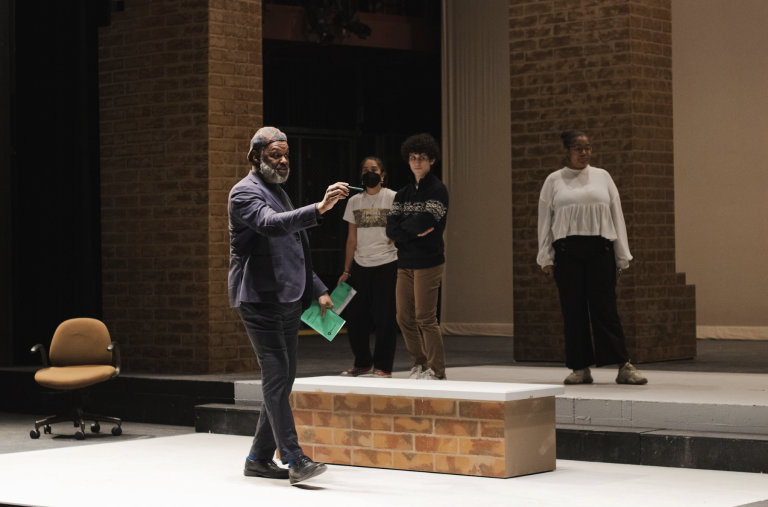TRIP SLAYMAKER ’18
ARTS AND ENTERTAINMENT
When Heathers premiered in 1988, it was meant to skewer and satirize the John Hughes-era high school coming-of-age movies that had dominated the box office during the decade of the eighties. Thanks to a hilarious and vicious script by Daniel Waters and the believable chemistry of the leads Winona Ryder and Christian Slater, Heathers was an obvious choice for musical adaptation. In a further stroke of luck, the recent Trinity-based production of Heathers: The Musical had the benefit of flawless, near prophetic casting decisions driving its chances for success.
Adelaide Jenkins ’18 took on the central role of Veronica Sawyer, a likable everyteen character who is an unquestionable “nobody” at Westerburg High. The school is alive with the obligatory and ever-present high-school characters you’ve come to know and love: they are the nerds, the jocks, the outcasts, and of course the titular squad of beautiful elites, the Heathers. Veronica addresses the audience, and it is from her perspective that the play unfolds. Jenkins delivers an admirably balanced performance in this first act of the play, remaining empathetic even as her agency slips more and more into the grasp of the popular clique. It is here that performances were allowed to be large and bombastic, especially in the case of group overlord Heather Chandler, played here by Lydia Haynes ’18. Haynes played the part of the powerful mean girl with a drawling carelessness that turns suddenly acid. Hers was a towering and delightful performance that would have been a missed opportunity in the hands of anyone but Haynes.
Veronica’s dependence on the approval of the Heathers to remain socially significant does not go unnoticed. Cooper Jennings ’19 plays J.D., a duster-wearing anarchist with a suspiciously light-hearted introductory number about brain freezes. Jennings’ fantasy-coiffed hair and cheekbones would have quickly propelled him to the high ranks of eighties love interests, but it was his ability to hint at the underlying darkness of the role that made both his performance and casting here another home run.
Veronica and J.D. are going steady when in a moment of diffused responsibility the pair murders the Heather-in-chief, Heather Chandler. The main conceit of the plot begins when the couple forges a suicide note to dodge responsibility. An audience member might expect the tone of the musical to shift at this point, though it only grudgingly does so, instead preferring to rise to meet the topic of teen suicide with intense satire. Because the deceased Heather was such an idol, the entire school begins to idolize the myth of teen suicide as a righteous protest against everyday ignorance.
Diana Rose Smith ’19 deserves praise for her turn as Ms. Fleming, who gave new life to one of the play’s more memorable lines: “Deciding whether to kill yourself or not is one of the most important decisions a teenager can make!” Smith’s performance emphasized the character’s backfiring love of self-exploration as a clueless counterpoint to the scheming, isolated and increasingly suicidal teens.
The play’s tongue-in-cheek take on suicide takes on a graver note after the deaths of Westerburg jocks Ram and Kurt. Guilt-ridden Veronica and wild-card J.D. take their project of social revenge to a new level when J.D. murders the two popular football players, playing their deaths off as a suicide pact between secret lovers. Jack Lynch ’18 and James Nash ’19 seemed to tap into centuries of slapstick tradition to bring Kurt and Ram to life, and the result was a peerless and hilarious performance for both. The two doltish jocks were played with a total fearlessness of physical space and expression on the part of their actors. The effort of Nash and Lynch propelled these two flat characters into what must have been some of the most successful comic performances in Trinity’s theater history.
The overall unity of the cast was expressed on stage by the clarity with which groups interacted during dance and fight sequences. This could only have been a difficult task to manage for such a large and involved cast. This essential group dynamic requires unflinching attention from every cast member, the benefit of which could clearly be seen. Supporting characters, though incidental to the main plot, were each fleshed out with impressive depth and subtlety of character. The pitiably uncool Martha Dunnstock, played by Casey Hearl ’20, is one such character, coming out of the woodwork of the first act to become a major emotional player in the second. The same can be said of the auxiliary Heathers, played by Maggie Powderly ’18 and Julia Adrian ’20. Though both Heathers were played as preening, grasping henchmen to the evil Heather Chandler, the absence of their guiding force leaves them stranded and helpless in the social hierarchy. The monumental task of both actresses was to make these character’s empathetic after spending so long making them appear evil.
By the end of the play, no character was a villain, no one wholly right or wrong. Though it is the goofy, puzzling ambiguity of the play that makes it interesting, it was the all-around competence and expert casting of Heathers that made it work. With the advent of Heathers, Trinity’s future theater installments will now have to be judged against the huge success of the 2017 spring musical.
Tuesday, January 14 2025
The Student Newspaper at Trinity College in Hartford, Connecticut




+ There are no comments
Add yours